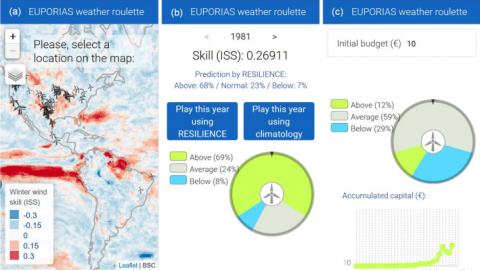More scientific results coming from the EUPORIAS project. In this case we are happy to announce that, in collaboration with our colleagues at the Barcelona Supercomputing Center (BSC), we have published the study The Weather Roulette: a game to communicate the usefulness of probabilistic climate predictions in the journal Bulletin of the American Meteorological Society (BAMS):
We apply a game to communicate the usefulness of climate predictions to users, showing that in skillful areas economic benefits are obtained in the long term.
Climate predictions, from three weeks to a decade into the future, can provide invaluable information for climate sensitive socio-economic sectors, such as renewable energy, agriculture or insurance. However, communicating and interpreting these predictions is not straightforward. Barriers hindering user uptake include a terminology gap between climate scientists and users, the difficulties of dealing with probabilistic outcomes for decision-making, and the lower skill of climate predictions compared to the skill of weather forecasts.
This paper presents a gaming approach to break communication and understanding barriers through the application of the Weather Roulette conceptual framework. In the game, the player can choose between two forecast options, one that uses ECMWF seasonal predictions against one using climatology-derived probabilities. For each forecast option, the bet is spread proportionally to the predicted probabilities, either in a single year game or a game for the whole period of 33 past years.
This paper provides skill maps for metrics commonly used by the scientific community (e.g. Ignorance Skill Score and Ranked Probability Skill Score) which, in the game, are presented with metrics easily understood by the business sector (e.g. interest rate and return-on-investment). In a simplified context, we illustrate how in skillful regions the economic benefits of using ECMWF predictions arise in the long-term and are higher than using climatology.
This paper provides an example of how to convey the usefulness of climate predictions and transfer the knowledge from climate science to potential users. If applied, this approach could provide the basis for a better integration of knowledge about climate anomalies into operational and managerial processes.
The paper can be found at the journal website and the resulting mobile app can be downloaded from Google Play.

